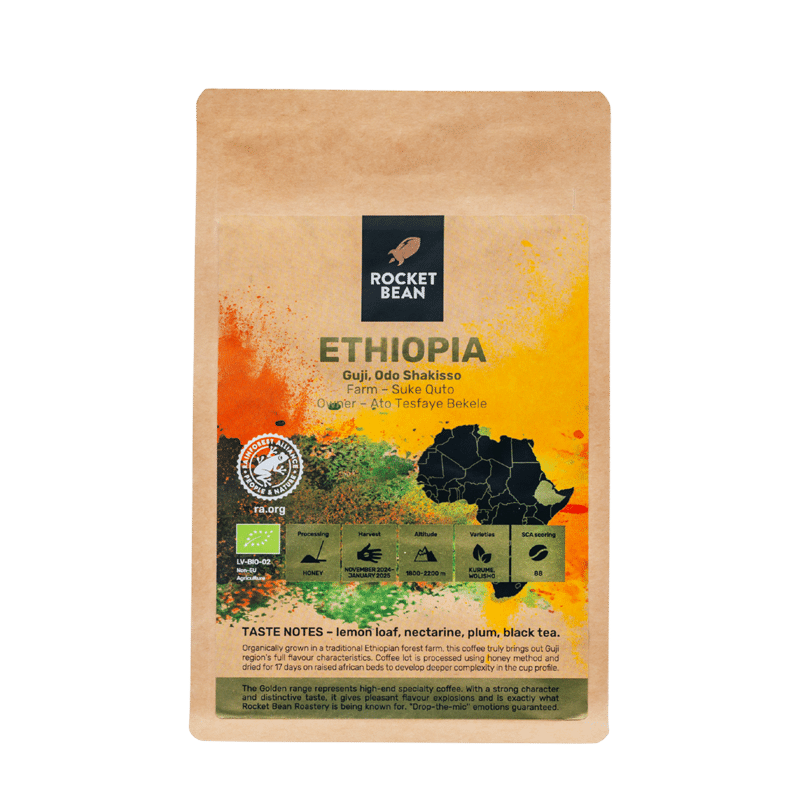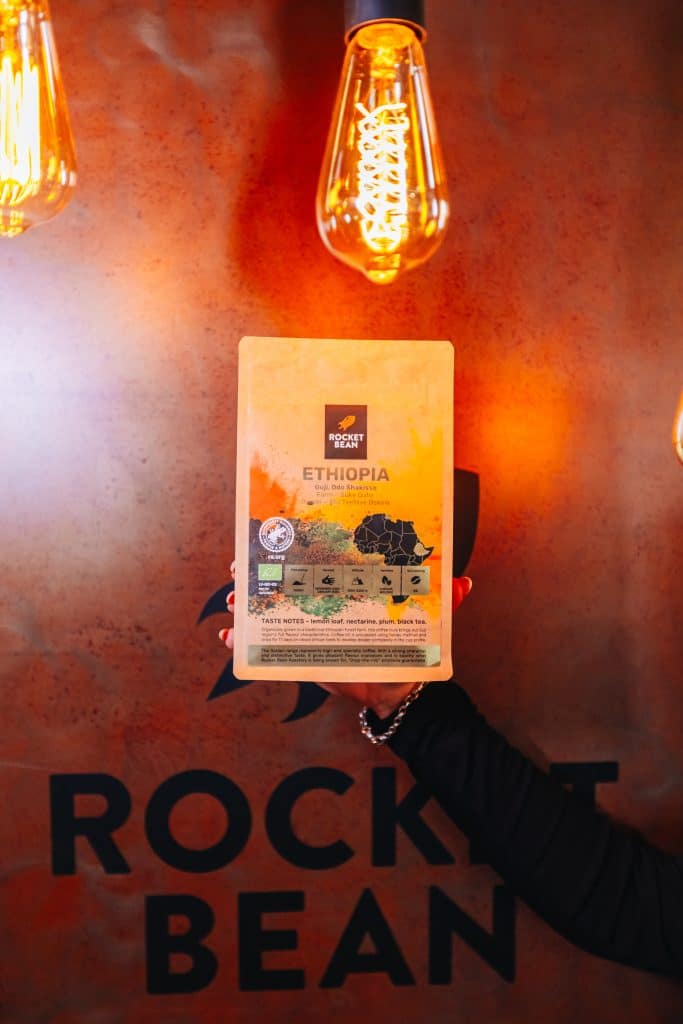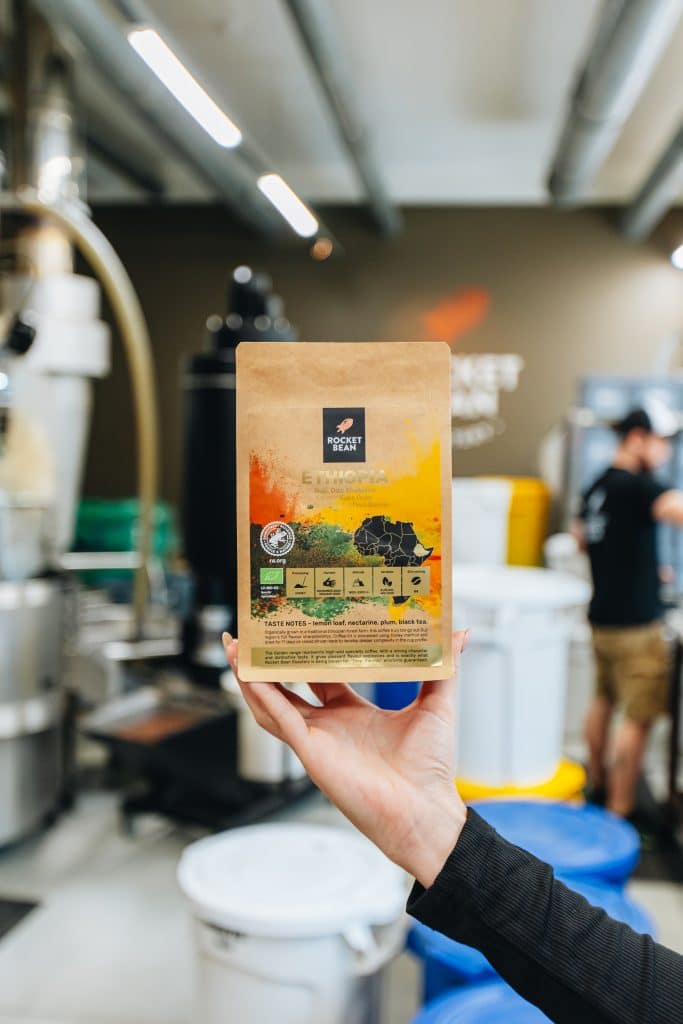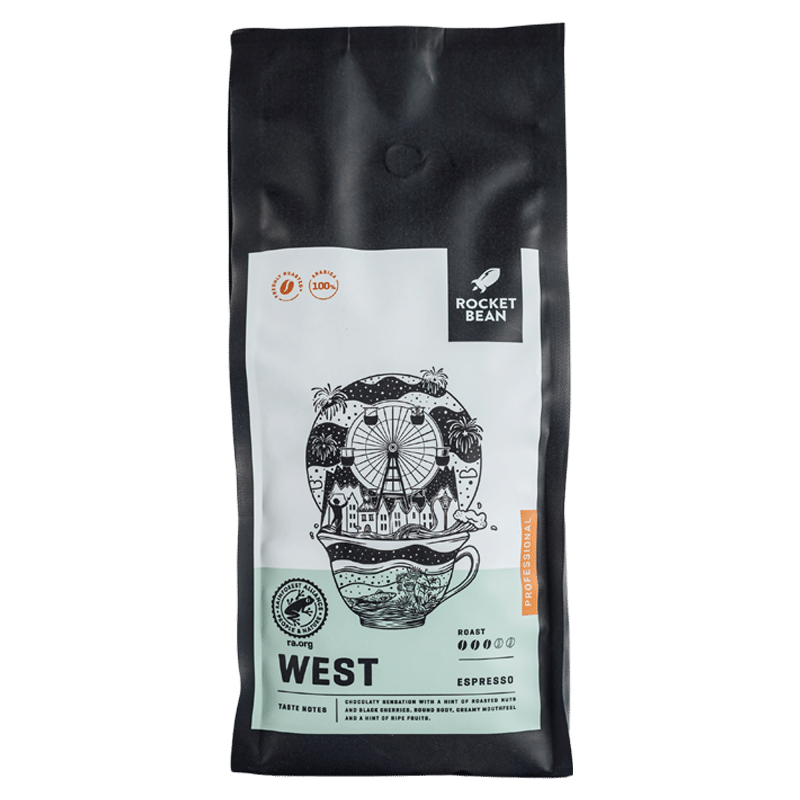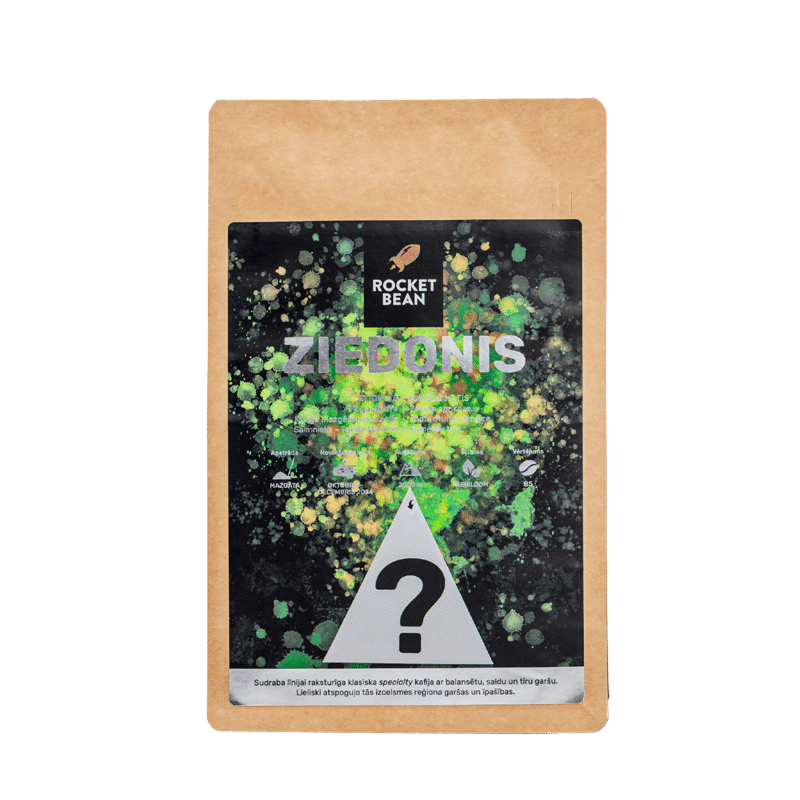Ethiopia | Honey, Organic
filter
- Country: Ethiopia
- Region: Guji, Odo Shakisso
- Producers: Ato Tesfaye Bekele
- Taste and Arome: Lemon loaf, nectarine, plum, black tea
17,00 €
Processing
Honey
Harvest
Nov 2024–Jan 2025
Altitude
1800–2200 m
Variety
Kurume, Wolisho
Scoring
88
Organically grown on a traditional Ethiopian forest farm, this coffee truly brings out the Guji region’s distinctive flavour profile. The lot is honey processed and dried for 17 days on raised African beds to develop greater complexity in the cup.
Ethiopia
Ethiopia is like the first sign of spring—fresh, full of life, and filled with bright, inviting scents. It’s the birthplace of coffee, offering a wide range of flavours that make each cup truly special. You can find everything from citrus and sweet stone fruits to juicy tropical fruits, all blended with floral, spicy, and light tea-like notes. Coffee has been a part of Ethiopian life for hundreds of years. There’s a famous story about a goat-herder named Kaldi who noticed his goats becoming lively after eating coffee cherries. That’s how coffee began to spread, eventually making its way around the world. But Ethiopia remains the heart of it all.
Different regions in Ethiopia have their own flavours. For example, Sidamo coffees often taste like tea with bright citrus notes. Guji coffees, on the other hand, are known for their rich, sweet fruit flavours—think ripe mango and peach—with a touch of jasmine and sometimes a little funk that makes them interesting and unique. These flavours don’t come from the land alone; they are the result of hard work of small farmers who take great care of their trees and land. They blend old traditions with new ideas every season, making sure the coffee is grown and processed the right way. It’s their dedication that brings out the amazing tastes Ethiopian coffee can offer.
Region – Guji
Guji is a coffee-growing region in southern Ethiopia, known for its beautiful highlands, rich volcanic soil, and forested farms. It used to be grouped with the larger Sidamo region, but over time, Guji has made a name for itself thanks to the unique flavours that come from its land and climate. Until the early 2000s, most people in the coffee industry didn’t recognize Guji as its own origin—but once roasters began separating it from Sidamo, its distinct cup profile quickly stood out.
Coffee here grows at high altitudes—usually between 1,800 and 2,200 meters—which helps the cherries ripen slowly and develop more sweetness. Guji coffees are loved for their bright, fruity character. It’s often easy to taste tropical fruit, sweet citrus, floral notes, and a silky, tea-like body even for non-specialty coffee drinkers.
Many farmers still grow coffee using traditional, organic methods, under the shade of native trees and in semi-forested environments. The region is home to the Guji Oromo people, a subgroup of the larger Oromo ethnic group, numbering around 5 million. Known for their agro-pastoral lifestyle, the Guji Oromo have a deep cultural connection to the land and coffee. For them, coffee is more than a crop—it’s part of daily life, tradition, and community. Many families have been growing coffee for generations, passing down knowledge through oral history and practical experience. This strong bond with their heritage and environment continues to shape how coffee is grown in Guji today.
Suke Quto
Suke Quto Farm is found in the green hills of Odo Shakisso, in Ethiopia’s Guji region. Today, it’s known around the world for its high-quality coffee—but it started from a place of loss. In the late 1990s, large forest fires destroyed much of the land in the region. At the time, Tesfaye Bekele was working as an environmental officer. He wanted to help the land recover, so he came up with an idea: plant coffee and shade trees to bring the forest back and give farmers a new way to earn a living.
At first, local people didn’t believe in his idea. Coffee trees take years to grow and yield a reasonable amount of cherries. Many locals didn’t want to wait that long, so Tesfaye started on his own. In 2000, he built a small nursery to grow coffee seedlings and planted the first trees by himself on a small piece of land. When those trees began to grow and produce cherries, local farmers saw the results. One by one, they came back asking for seedlings—and many joined the project. That was the beginning of what would become Suke Quto Farm.
Today, the farm delivers amazing single-estate lots and also works together with more than 170 smallholder farmers. Suke Quto is certified Organic and Rainforest Alliance, and still follows natural, eco-friendly farming methods. The soil in the area is rich and volcanic, and Tesfaye avoids using chemicals—he relies instead on natural compost and shade trees. The coffee grows under a natural, forest-like canopy, helping protect both the land and the crop.
Processing
At Suke Quto, the coffee process starts with carefully handpicking only the ripest red cherries. Once harvested, the cherries are sorted by hand to remove any underripe or damaged ones, ensuring only the best fruit moves forward. That same day, the cherries are pulped, and during this step, the beans are also graded. Then, beans, still coated in their sticky mucilage, are spread out in thin layers on raised African drying beds and dried under direct sunlight for the first three days—without going through fermentation. After this initial sun drying, the beans are moved into shaded areas and laid out in thicker layers. This slows the drying process and allows moisture to leave the beans more gradually, which helps preserve sweetness and clarity in the final cup. In total, drying takes around 15 to 17 days, depending on weather conditions. The result is a clean, balanced coffee with concentrated flavour and even moisture content. Then, coffee is husked and packed in 60kg bags that make their way to Rocket Bean Roastery warehouse in Latvia.
